Olympic Quad Begins in Europe
Published on March 26th, 2017
The Spanish showcase Trofeo Princesa Sofía IBEROSTAR Regatta starts the new Olympic quadrennial in Europe on March 27 to April 1 when the waters of Palma, Mallorca welcome 646 boats and 833 sailors from 53 different nations, setting out on the first stages of what many hope will be a successful journey to the 2020 Olympic regatta in Tokyo, Japan.
This year it is once more the first event of the Eurosaf Champions Sailing Cup, but the event is also keen to be a catalyst for changes. On display this week will be a host of new formats and schedules which are designed to make the finale for each class more exciting and more easily understood, ideally holding tension and excitement right into the very last stages of each of the ten class events.
Each of the changes for the Finn, RS:X, 49er and 49erFX as well as the 470 classes have been proposed and refined by the classes themselves in cooperation with World Sailing.
For example, the 49er and 49er FX Classes will now be decided over three ten minute races over an Arena Style rectangle course. The RS:X Men and Women will be distilled down to a 10 sailor Quarter Final moving forward to a six boards semi final from which two advance to a three strong final including the outright winner of the Opening Series.
Ferran Muniesa Manager of the Trofeo Princesa Sofía explains:
“It was immediately obvious from last November’s World Sailing General Meeting that Olympic sailing needs changes to the format which was used in Rio 2016, as pushed for by the International Olympic Committee, by the Olympic classes and by the sailors themselves, recognising that Final day needs to be more understandable.
“At the last Olympics there were several cases where medals were already won before the Medal Race and that does not make sense to those who maybe do not know sailing, nor does it make for an exciting finale.
“So we agreed with the Events Committee to get in touch with all of the different classes and to look at their proposals. Thus all off these formats come from the classes themselves. There is no point in experimenting without the backing of the classes. Now we hope we have formats which are more understandable to non-experts.
“We are a regatta which likes to innovate and to rise to a challenge like this. We have had a lot to adapt, not least the result systems. In practical terms, that also means another course area on the last day and more people to run it. It’s a great challenge for the Trofeo Princesa Sofía IBEROSTAR.
“At first when we went through the proposals, our people were looking at me like ‘what on earth?’ Now here we are ready to do it all. This is the right time to do it. We can be a little more flexible at this time in the quadrennial but you have to test it on a big scale like this, at a good level.”
Format Summary
The RS:X Classes compete in six qualifying races Monday to Wednesday in two groups followed by up to four races Thursday and Friday.
From this ten race opening series the sailors placed third to 12th race off a Quarter Final of 10. The top five advance to a Semi Final of six boards, including the sailor who took second place overall in the Opening Series. The top two sailors advance to a Grand Final of three boards which includes the sailor who took first the Opening Series.
The FINN Class compete in an eight race opening series Monday to Thursday. The top two boats from this Opening Series advance straight to the five boat one race Grand Final. Three boats, that is third, fourth and fifth advance to an eight boat Semi Final. On Friday there is a one race Semi Final Qualifier from which only the top five advance to the eight boat Semi Final. From this Semi Final the top three sailors go into the one race showdown Grand Final along with the top two from the Opening Series.
The 470 classes race Monday to Wednesday in two groups over six races. Thursday and Friday there are 6 races comprising a Semi Finals for the 20 boat Gold Fleet. The key difference is that each of the first two series carry forward one aggregate points tally (including one discard in Qualifying and one in Semi Final). Based on the overall results from these then the top eight boats go into the Grand Final.
The 49er fleet race in two groups Monday and Tuesday and then Wednesday and Friday are Semi Finals for 25 boats. From these aggregate scores there are ten boats advancing to a three race Medal Race Final.
The 49er FX race an Opening Series Monday to Friday followed by a three race Medal Race Final for the top ten.
The NACRA 17 compete Monday to Friday in a 15 race Opening Series. The top ten advance to a one race Medal Race.
The Laser and Laser Radial fleets race their ten race Opening Series over Monday to Friday, splitting to a Gold and Silver fleet for the Radials Wednesday and Friday, and a Gold, Silver and Bronze fleet for the Laser Standards. The top ten advance to the Medal Race.
Who’s Who?
As usual the fleets contain a mix of Olympic stars and medallists looking to keep their game sharp, new pairings casting off on their new pathways together. Others might be simply dipping a toe back in the water for the sheet fun and enjoyment of racing at this hugely popular, accessible warm weather venue.
In the 470 Men’s Class which has 56 entries Greece’s bronze medallists Pangiotis Mantis and Pavlos Kagialis return to the regatta where they finished third last year. They arrive fresh from finishing third in Miami in January. The USA’s Stu McNay and Dave Hughes won the Miami SWC event and were fourth in Rio 2016 and second at the 2016 Trofeo Princesa Sofía IBEROSTAR.
In the 470 Women’s Class there are 42 entries. The Netherlands Afrodite Zegers and Annelous van Veen arrive at the YC Arenal after winning the Miami SWC and finishing fourth at the 2016 Olympic Sailing Regatta. Last year on these same Palma waters they finished runners up in the 470 Europeans. Slovenia’s Tina Mrak and Veronica Macarol were sixth here last year, sixth in the Europeans and sixth in Rio at the Olympics.
In the 49er Class Ireland’s Ryan Seaton, tenth in Rio, won the class here last year but sails this time with Seafra Guilfoyle. Argentina’s young pairing of Yago and Klaus Lange finished seventh in Rio and were fifth in Miami at the Sailing World Cup. Poland’s Lukasz Przybytek and Pawel Kolodzinski were eighth in Rio and seventh in the 49er Europeans last year in Barcelona. And the Spanish pair of Diego Botin and Lago Lopez Marra were third in Miami, third in the 2016 Europeans and third in Palma last year and ninth in the Olympic regatta in Rio. In Miami in January Brasilian legend five times Olympic medallist Robert Scheidt opened a new chapter in his storied career with 16th at his first regatta in the 49er class with crew Gabriel Borges. They will be looking to prove their progression here. GBR’s 2004 Olympic bronze medallist Simon Hiscocks races with young Daniel Budden. Compatriots Dylan Fletcher and Alan Sign, sixth in Rio, start here after winning Miami.
In the 49er FX Class GBR’s Olympic 470 gold medal winning helm Hannah Mills sails he first regattas in the women’s skiff class, here offering a mixed sex option, with Alan Sign. Eighth in Rio GBR’s Charlotte Dobson races with Saskia Tidey in a new partnership. Germany’s Victoria Jurczok Anika Lorenz were ninth in Rio.
Brazil’s Jorge Zarif is probably top seed in the Finn class after his victory in Miami and pushes into the new quadrennial after fourth in Rio. Sweden’s Max Salminen, Argentina’s Facundo Olazza and Hungary’s Zsombor Berecz will be among the top contenders.
In the Laser Standard fleet which has 134 entries USA’s Charlie Buckingham was 11th in Rio just ahead of Italy’s Francesco Marrai and these two will be among the leading challengers. Britain’s Lorenzo Chiavarini was third in Miami finishing just ahead 2015 World Champion Nick Thompson. Top seed in the Laser Radial class is Belgium’s 2012 bronze medallist Evi Van Acker and Finland’s Tuula Tenkanen who were fourth and fifth respectively in Rio.
The NACRA 17 class will witness the new pairing of Iker Martinez and Olga Maslivets. The Spanish double Olympic medallist is now partnered by the Ukranian-Russian sailor who previously raced in the RS:X class, winning the Sofia IBEROSTAR regatta last year.
The RS:X classes, Men and Women, look to be very open. In the Men’s fleet the host nation’s Ivan Pastor Lafuente was best placed in Rio, finishing ninth. In the Women’s fleet Finland’s Tuuli Petaja-Siren was tenth in Rio. China’s Manjia Zheng was third in Miami in January ahead of GBR Isobel Martin who was fifth in Miami.
Event details – Entry list – Scoreboard – Facebook
Source: Trofeo S.A.R. Princesa Sofía – Mallorca 2017


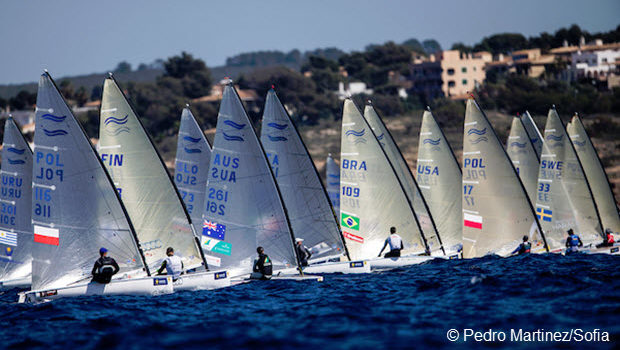


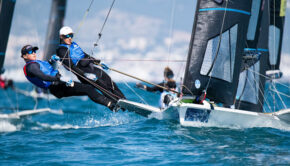
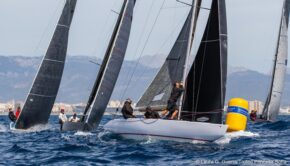
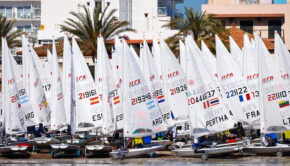
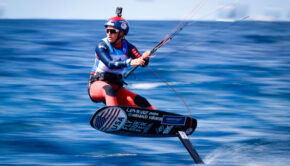
 We’ll keep your information safe.
We’ll keep your information safe.